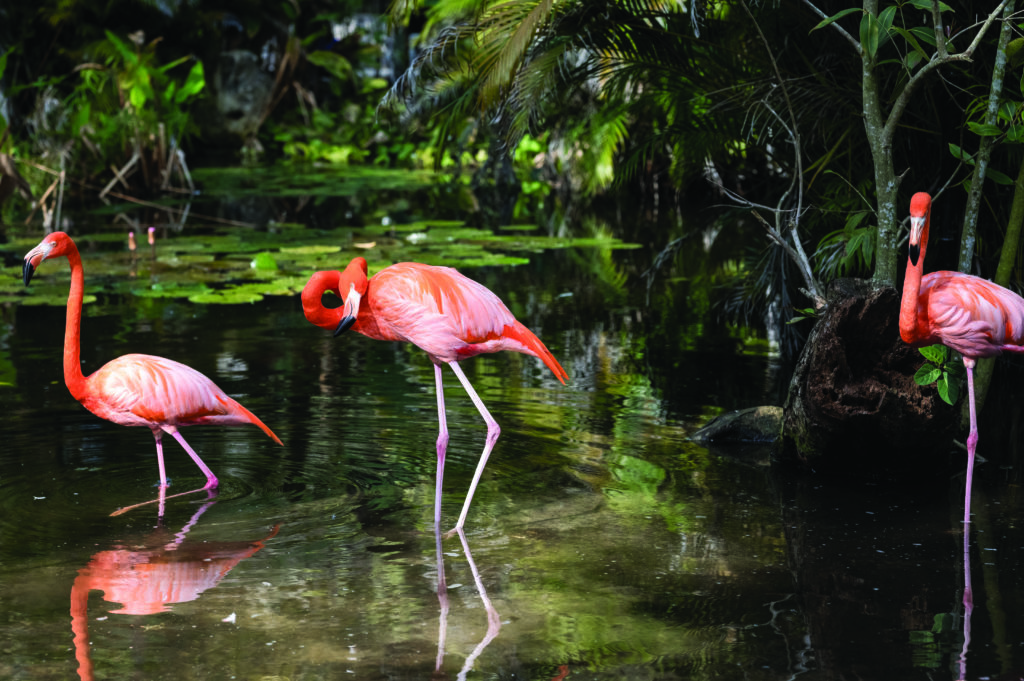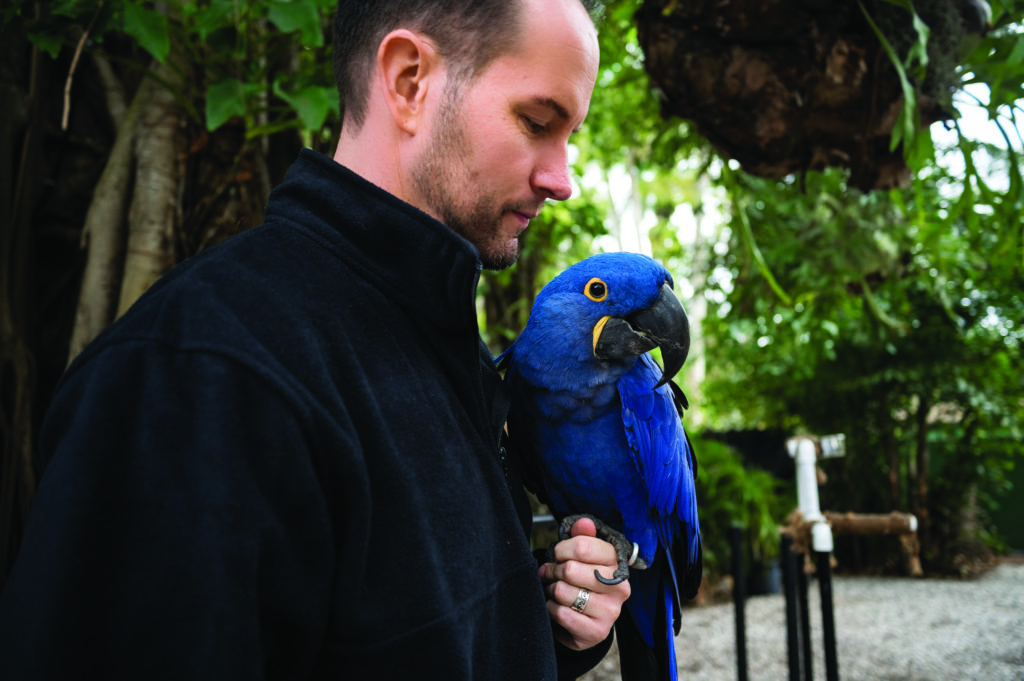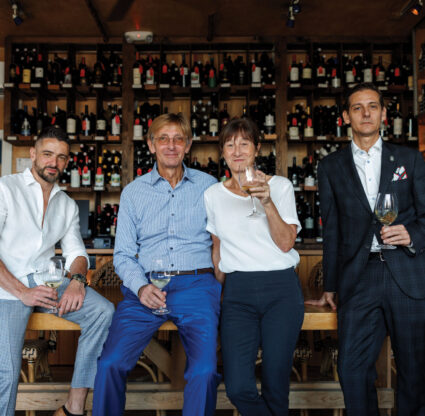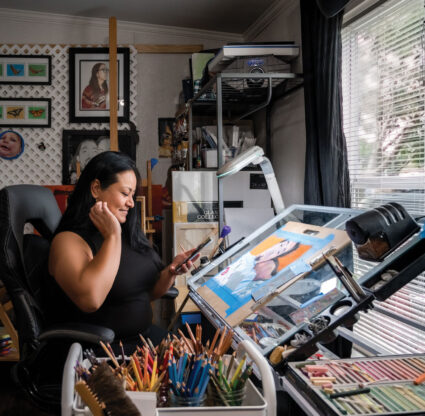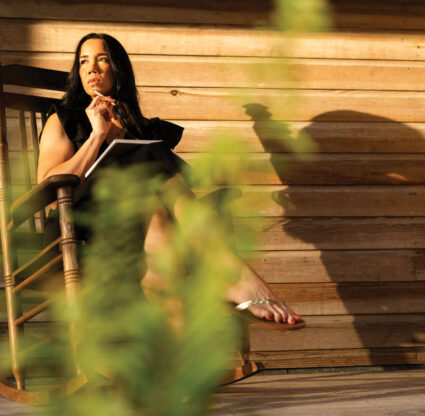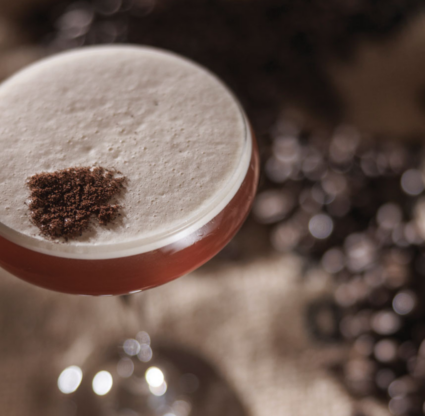From the outside, the Wonder Gardens looks very similar to how it did when it opened 86 years ago as a stop for families driving along Tamiami Trail in Bonita Springs.
With its front porch and tropical palette of teal and turquoise paint, the welcome center still gives the popular roadside attraction, known for botanical gardens and wildlife enclosures, an Old Florida feel. But inside, guests find the first significant change from Wonder Gardens’ new CEO David Rahahę•tih Webb: birds.
They sit on turquoise and coral midcentury modern steel umbrellas—oversized versions of the ones you’d find garnishing a piña colada. There are macaws with green, aqua and tangerine plumage and white cockatoos with spiked mohawks. Rainbow lorikeets perch in an aviary, and elegant peacocks strut the grounds. There’s even a lime-green Amazon parrot named Kiwi who sings opera and says, “Good morning.” They were all rescued by the nonprofit Bird Garden of Naples, and they help make this colorful entrance, surrounded by flowering orchids, a far cry from what it used to be. “Honestly, this area used to look like a cesspool,” Webb says. “Guests would be greeted by this large rectangular pit with cinder blocks resting in muddy, smelly water, and there was a random shed with a low-hanging, rusty metal roof.”
Before Webb came on board, the Wonder Gardens’ animals lived in much different environments. For years, the alligator pit featured more than 50 gators of all sizes, often piled on top of one another, resulting in frequent violence. The panther and bear exhibits were shockingly small by today’s standards. Structures grew dilapidated and infested with rodents and termites over time, and the animals’ diets, tossed at will from countless visitors each day (via purchased food cups), were unhealthy.
Today, there are noticeably fewer alligators in the alligator pit. What was once a caged bear enclosure the size of a dining room is now an aviary for colorful macaws to fly in. Rotting wood structures have been replaced with ones made of weather-resistant materials.
These changes are inspired by a feeling Webb, a 43-year-old, ninth-generation Southwest Florida native, had when he visited the Wonder Gardens as a kid. “I left there feeling sad,” Webb says. “But back then, the standards and conditions for the animals were way different than today’s expectations.”
Webb, who grew up in Estero and Sanibel as a member of the Meherrin and Pee Dee tribes, was raised with the cultural understanding that all living things have intrinsic value. In high school, he was one of the students involved in creating Conservation 20/20, a tax-funded program to protect wildlands in Lee County. At 16, he volunteered with a veterinarian who cared for the Wonder Gardens’ animals. He recalls bottle-feeding a struggling juvenile panther, which ended up dying weeks later, and the veterinarian saying she was concerned about the care animals received at the Wonder Gardens.
These experiences, combined with the values he learned growing up, influenced Webb’s outlook on zoos and animal attractions. After graduating from Florida Gulf Coast University, he held directorial roles at nature centers, museums and conservation programs across Florida, including serving as the nature center director of the Conservancy of Southwest Florida in Naples. In the summer of 2020, he received a call about a chance to run the Wonder Gardens.
Webb was hesitant at first, primarily because of his childhood memories. But then he started thinking about the possibilities: The Wonder Gardens could be a place where animals would be prioritized and cared for based on industry standards. Instead of finding the biggest and best, there could be an emphasis on rescued and rehabilitated animals.
Now, the alligator pit features only 15 gators, none more than 5 feet long—a decision Webb says reduces stress and prevents them from harming one another. A veterinarian comes in weekly to check on the health of each animal, and a database tracks those records. Specific commercialized diets mixed with fresh meat and vegetables are provided to each species, and guests no longer feed the animals. “The animals aren’t there for us to make money off of,” Webb says. “We could keep selling unlimited food and continue to make $5,000 a month just off of that. But I would rather do something better for the animals.”
The Wonder Gardens had a record-breaking year in 2021, with revenue climbing to nearly $2 million. And it’s using a $250,000 private donation for something exciting in 2022. Later this year, the Wonder Gardens premieres its otter exhibit, with an underwater tunnel where kids and limber adults can crawl through and ‘swim’ with the otters. Webb hopes exhibitions and opportunities like this connect kids with animals and inspire them to think about their conservation. It’s also a lot of fun: “I’m going to want to move my office into that little tunnel underwater,” he says.

